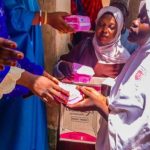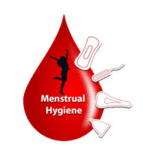Young women and girls in Nigeria struggle with menstrual hygiene management due to Poverty leading to poor educational outcomes.
Advocates of the girl child visited an internally displaced person’s camp in Abuja to donate menstrual hygiene products to young women and girls in order to encourage education for the girl child.
Absence of information about menstruation continues to dominate the puberty scene for most young girls of reproductive age.
Globally, this lack of information is one of the major challenges of menstrual hygiene management.

Period puberty is a reality for many young women and girls in low and middle income countries who have no choice but to use alternatives in place of proper menstrual hygiene products.
Today, this internally displaced persons camp in the Durumi part of the nation’s capital city has some visitors who have come to raise awareness for young women and girls about menstrual hygiene management.
One of the IDPs, Fatima who spoke to TVC News said she has been living in the camp for the past six years. She admits that young girls like her have gotten a lot more support through the donation of menstrual hygiene products.
The lack of proper hygiene management information is being addressed at the camp in order to improve the health outcomes of young women and girls.
Advocates also urge the government to make menstrual hygiene products free to enable young women and girls access to
it.
Poor menstrual hygiene can cause physical, health risk and has been linked to reproductive and urinary tract infections leading to poor educational outcomes
Young women and girls in Nigeria struggle with menstrual hygiene management due to Poverty leading to poor educational outcomes.
Advocates of the girl child visited an internally displaced person’s camp in Abuja to donate menstrual hygiene products to young women and girls in order to encourage education for the girl child.
Absence of information about menstruation continues to dominate the puberty scene for most young girls of reproductive age.
Globally, this lack of information is one of the major challenges of menstrual hygiene management.

Period puberty is a reality for many young women and girls in low and middle income countries who have no choice but to use alternatives in place of proper menstrual hygiene products.
Today, this internally displaced persons camp in the Durumi part of the nation’s capital city has some visitors who have come to raise awareness for young women and girls about menstrual hygiene management.
One of the IDPs, Fatima who spoke to TVC News said she has been living in the camp for the past six years. She admits that young girls like her have gotten a lot more support through the donation of menstrual hygiene products.
The lack of proper hygiene management information is being addressed at the camp in order to improve the health outcomes of young women and girls.
Advocates also urge the government to make menstrual hygiene products free to enable young women and girls access to
it.
Poor menstrual hygiene can cause physical, health risk and has been linked to reproductive and urinary tract infections leading to poor educational outcomes
Young women and girls in Nigeria struggle with menstrual hygiene management due to Poverty leading to poor educational outcomes.
Advocates of the girl child visited an internally displaced person’s camp in Abuja to donate menstrual hygiene products to young women and girls in order to encourage education for the girl child.
Absence of information about menstruation continues to dominate the puberty scene for most young girls of reproductive age.
Globally, this lack of information is one of the major challenges of menstrual hygiene management.

Period puberty is a reality for many young women and girls in low and middle income countries who have no choice but to use alternatives in place of proper menstrual hygiene products.
Today, this internally displaced persons camp in the Durumi part of the nation’s capital city has some visitors who have come to raise awareness for young women and girls about menstrual hygiene management.
One of the IDPs, Fatima who spoke to TVC News said she has been living in the camp for the past six years. She admits that young girls like her have gotten a lot more support through the donation of menstrual hygiene products.
The lack of proper hygiene management information is being addressed at the camp in order to improve the health outcomes of young women and girls.
Advocates also urge the government to make menstrual hygiene products free to enable young women and girls access to
it.
Poor menstrual hygiene can cause physical, health risk and has been linked to reproductive and urinary tract infections leading to poor educational outcomes
Young women and girls in Nigeria struggle with menstrual hygiene management due to Poverty leading to poor educational outcomes.
Advocates of the girl child visited an internally displaced person’s camp in Abuja to donate menstrual hygiene products to young women and girls in order to encourage education for the girl child.
Absence of information about menstruation continues to dominate the puberty scene for most young girls of reproductive age.
Globally, this lack of information is one of the major challenges of menstrual hygiene management.

Period puberty is a reality for many young women and girls in low and middle income countries who have no choice but to use alternatives in place of proper menstrual hygiene products.
Today, this internally displaced persons camp in the Durumi part of the nation’s capital city has some visitors who have come to raise awareness for young women and girls about menstrual hygiene management.
One of the IDPs, Fatima who spoke to TVC News said she has been living in the camp for the past six years. She admits that young girls like her have gotten a lot more support through the donation of menstrual hygiene products.
The lack of proper hygiene management information is being addressed at the camp in order to improve the health outcomes of young women and girls.
Advocates also urge the government to make menstrual hygiene products free to enable young women and girls access to
it.
Poor menstrual hygiene can cause physical, health risk and has been linked to reproductive and urinary tract infections leading to poor educational outcomes
Young women and girls in Nigeria struggle with menstrual hygiene management due to Poverty leading to poor educational outcomes.
Advocates of the girl child visited an internally displaced person’s camp in Abuja to donate menstrual hygiene products to young women and girls in order to encourage education for the girl child.
Absence of information about menstruation continues to dominate the puberty scene for most young girls of reproductive age.
Globally, this lack of information is one of the major challenges of menstrual hygiene management.

Period puberty is a reality for many young women and girls in low and middle income countries who have no choice but to use alternatives in place of proper menstrual hygiene products.
Today, this internally displaced persons camp in the Durumi part of the nation’s capital city has some visitors who have come to raise awareness for young women and girls about menstrual hygiene management.
One of the IDPs, Fatima who spoke to TVC News said she has been living in the camp for the past six years. She admits that young girls like her have gotten a lot more support through the donation of menstrual hygiene products.
The lack of proper hygiene management information is being addressed at the camp in order to improve the health outcomes of young women and girls.
Advocates also urge the government to make menstrual hygiene products free to enable young women and girls access to
it.
Poor menstrual hygiene can cause physical, health risk and has been linked to reproductive and urinary tract infections leading to poor educational outcomes
Young women and girls in Nigeria struggle with menstrual hygiene management due to Poverty leading to poor educational outcomes.
Advocates of the girl child visited an internally displaced person’s camp in Abuja to donate menstrual hygiene products to young women and girls in order to encourage education for the girl child.
Absence of information about menstruation continues to dominate the puberty scene for most young girls of reproductive age.
Globally, this lack of information is one of the major challenges of menstrual hygiene management.

Period puberty is a reality for many young women and girls in low and middle income countries who have no choice but to use alternatives in place of proper menstrual hygiene products.
Today, this internally displaced persons camp in the Durumi part of the nation’s capital city has some visitors who have come to raise awareness for young women and girls about menstrual hygiene management.
One of the IDPs, Fatima who spoke to TVC News said she has been living in the camp for the past six years. She admits that young girls like her have gotten a lot more support through the donation of menstrual hygiene products.
The lack of proper hygiene management information is being addressed at the camp in order to improve the health outcomes of young women and girls.
Advocates also urge the government to make menstrual hygiene products free to enable young women and girls access to
it.
Poor menstrual hygiene can cause physical, health risk and has been linked to reproductive and urinary tract infections leading to poor educational outcomes
Young women and girls in Nigeria struggle with menstrual hygiene management due to Poverty leading to poor educational outcomes.
Advocates of the girl child visited an internally displaced person’s camp in Abuja to donate menstrual hygiene products to young women and girls in order to encourage education for the girl child.
Absence of information about menstruation continues to dominate the puberty scene for most young girls of reproductive age.
Globally, this lack of information is one of the major challenges of menstrual hygiene management.

Period puberty is a reality for many young women and girls in low and middle income countries who have no choice but to use alternatives in place of proper menstrual hygiene products.
Today, this internally displaced persons camp in the Durumi part of the nation’s capital city has some visitors who have come to raise awareness for young women and girls about menstrual hygiene management.
One of the IDPs, Fatima who spoke to TVC News said she has been living in the camp for the past six years. She admits that young girls like her have gotten a lot more support through the donation of menstrual hygiene products.
The lack of proper hygiene management information is being addressed at the camp in order to improve the health outcomes of young women and girls.
Advocates also urge the government to make menstrual hygiene products free to enable young women and girls access to
it.
Poor menstrual hygiene can cause physical, health risk and has been linked to reproductive and urinary tract infections leading to poor educational outcomes
Young women and girls in Nigeria struggle with menstrual hygiene management due to Poverty leading to poor educational outcomes.
Advocates of the girl child visited an internally displaced person’s camp in Abuja to donate menstrual hygiene products to young women and girls in order to encourage education for the girl child.
Absence of information about menstruation continues to dominate the puberty scene for most young girls of reproductive age.
Globally, this lack of information is one of the major challenges of menstrual hygiene management.

Period puberty is a reality for many young women and girls in low and middle income countries who have no choice but to use alternatives in place of proper menstrual hygiene products.
Today, this internally displaced persons camp in the Durumi part of the nation’s capital city has some visitors who have come to raise awareness for young women and girls about menstrual hygiene management.
One of the IDPs, Fatima who spoke to TVC News said she has been living in the camp for the past six years. She admits that young girls like her have gotten a lot more support through the donation of menstrual hygiene products.
The lack of proper hygiene management information is being addressed at the camp in order to improve the health outcomes of young women and girls.
Advocates also urge the government to make menstrual hygiene products free to enable young women and girls access to
it.
Poor menstrual hygiene can cause physical, health risk and has been linked to reproductive and urinary tract infections leading to poor educational outcomes














